- Home
- Pauline Fisk
Mad Dog Moonlight Page 2
Mad Dog Moonlight Read online
Page 2
But one night Aunty heard Mad Dog. ‘What’s the matter?’ she said, coming into his room and sitting on his bed. ‘You can tell me. Come on, Ryan. There are lots of things that we could talk about if you’d only open up. You know you can tell your aunty anything. There’s a good boy.’
Mad Dog turned away from her. There were things he might have opene up about – mysteries in his life that he couldn’t explain – but how could he talk about them to someone who wouldn’t even call him by his proper name?
‘Ryan, speak to me,’ Aunty said. ‘You’ve been silent ever since you’ve got here, and this can’t go on. You’ve got a story to tell and we want to know what it is. We want to help you, but we can’t if you won’t tell us anything about yourself. Is there something you’re frightened of? Something that happened to you that you want to forget? Do you have a secret? Come on, Ryan, open up.’
Still Mad Dog didn’t answer, and Aunty finally gave up, saying that, if he changed his mind, he knew where she was.
‘What was wrong?’ he heard Uncle saying as she climbed back into bed.
‘He wouldn’t tell me,’ she answered.
‘He’s a strange one,’ Uncle said.
‘You’d be strange if the police had found you wandering around with a baby in your arms and you didn’t know whose it was, or who you were or where you’d come from,’ Aunty said.
She made excuses for Mad Dog all the time. Of all the children who came through the house, he was the special one. When he wouldn’t eat, she refused to scold. When he threw a mad dog fit and started chucking things about, she tried to laugh it off. Even when he stood for days on end staring out of the window, his face as blank as a plain piece of paper, she refused to let it get to her.
Those were the worst times, though. And not just worst for Aunty, who couldn’t get through to Mad Dog or understand what was going on inside his head, but worst for him too, who felt as if a bottomless pit lay inside of him and he was falling down it. There’d be times when his refusal to eat would go on for days, and nameless terrors inside of him seemed to rise to the surface, almost close enough to touch.
Sometimes Mad Dog would feel so frightened about what was happening to him that he’d wet himself or do even worse. Then Aunty’s sisters would see the extra washing hanging on the line and huddle in the kitchen with her, saying that though she’d had years of fostering experience behind her and been on courses run by social services and things like that, perhaps this time she’d bitten off more than she could chew.
Mad Dog heard them, but he didn’t understand what they were on about. Words like ‘fostering’ meant nothing to him. One day somebody called ‘his social worker’ came round to talk to him, but he didn’t know what a social worker was and nobody explained.
She was a tall woman with a wobbly face who encouraged Mad Dog to draw pictures of his old life. Could he draw his parents? she wanted to know. Could he draw his home? Was it on a street? In a town, or in a village? Did it stand alone? Could he remember anything in particular about it? A colour on the front door? A number? A pet? A garden? Any sort of landmarks anywhere nearby?
Mad Dog must have a home somewhere, the social worker insisted. Was it in the Preseli Mountains like Aunty had suggested, or somewhere inland among the mountains of mid-Wales? Or did Mad Dog belong further away than that, over the border in England, maybe in a city somewhere, far from where he’d been found? The police had looked everywhere, but they’d drawn a blank. Surely there was some place waiting for him to come back. And if not a mother or father, then grandparents, aunties, uncles. Somebody.
But Mad Dog wouldn’t answer. When people asked him questions like this, a deep silence would fall upon him and it wasn’t just a matter of being unable to remember things – he didn’t even want to remember them. Didn’t people understand that memories were dangerous things, best left untouched? If things were slipping from his grasp – like his parents’ faces, for example – perhaps it was all that he deserved.
Mad Dog didn’t want to lose the memory of his parents’ faces, but the fear rose up in him that perhaps he’d done something terrible and they were angry with him. He’d better behave at No. 3, he told himself, or else it just might happen here as well. He’d try harder to be the Ryan Lewis that everybody wanted, smiling back when people smiled at him and asked how he was today, and eating what they gave him and being a good boy.
But, for all his trying, the old Mad Dog Moonlight was never far behind. At the slightest provocation, Aunty and Uncle would find themselves confronted by an angry child, more wolf than boy, snarling, biting and throwing things about.
Then the social worker would be invited round again, and Aunty’s sisters would chip in with their good advice. ‘Syndromes’ and ‘psychological assessments’ would be talked about, but Aunty wouldn’t have any of it. Against all comers, she stood her ground.
‘We’re in unknown territory,’ she kept on saying. ‘We can’t play this by the book. How often have any of us come across a child who doesn’t know where he’s come from, let alone who he is? I mean, when he first arrived, he thought he was a dog and his brother was Elvis Presley! There’s a story in that boy waiting to come out. And one day it will, you mark my words, and I’ll be there for him when it does. He hasn’t got a syndrome and he doesn’t need assessments. All he needs is time, and a bit of love.’
2
The Ffon
One morning Mad Dog awoke to find a walking cane lying across the bottom of his bed. It was a tall, thin thing, made of polished wood, with a silver topknot. Mad Dog was certain it hadn’t been there when he’d gone to sleep the night before, and yet there was something strangely familiar about it.
Mad Dog only had to pick it up, feel its weight in his hand and run his fingers over the topknot for something from his old life to come flooding back. He could see his mother again, see the face he’d almost forgotten, lost in rapt attention as she engraved a pattern on the topknot with the little tool she used for making silver jewellery. Then suddenly he could see his dad too – see him polishing the whole finished cane from top to toe, and hear him saying that it was his, Mad Dog’s.
‘It’s your ffon,’ he said, using the Welsh word for walking cane, which Mad Dog thought he had forgotten. ‘We’ve made it especially for you. It’s for when you grow up and want to know who you are. It’s not a toy – so don’t you play around with it. Over my dead body, after all the trouble we’ve taken, are you going out with it and losing it somewhere!’
Mad Dog dropped the ffon immediately when he remembered that. Was that what he’d done? Taken it somewhere and lost it, and lost himself into the bargain?
Aunty called upstairs that breakfast was ready. Mad Dog thought about hiding the ffon under the bed. But curiosity got the better of him and he took it downstairs instead, hoping that Aunty could explain where it had come from.
‘At last,’ she said as he walked through the door. ‘What does it take to make you get up in the morning? What time do you call this?’
Mad Dog sat down with the ffon. Aunty put his breakfast in front of him. He tapped the ffon on the floor, but she didn’t say anything except, ‘Well, aren’t you going to eat?’
Mad Dog tapped the ffon on the floor again, only louder. Why was Aunty ignoring it? And what did she know that she wasn’t telling him? When she’d tucked him up in bed last night, there’d been no ffon. When she’d turned out the lights, there’d been no ffon. When he’d gone to sleep there’d been no ffon, and now here was his ffon and surely she, of all people – here in her own house – had to know what was going on!
‘Stop teasing me,’ he said. ‘Where did this come from? You must know. Did someone drop it off? And did they leave me a message?’
Aunty looked confused. ‘I don’t know what you’re on about,’ she said. ‘Nobody dropped anything off, certainly not that stick. You had it with you when you came.’
Anger rose inside Mad Dog. He banged the ffon on the floor, knowing that he h
adn’t brought it with him, no way. But was it possible that his parents had brought it? Were they here somewhere, waiting to leap out, crying, ‘Surprise, surprise’?
Mad Dog leapt down from the table, sent his breakfast flying and started tearing round the house, searching everywhere for his parents. Aunty came after him, crying at him to calm down, but he started swinging the ffon at her, sending ornaments flying.
‘Dear God, Ryan!’ Aunty cried. ‘What’s up with you? Give me that stick!’
‘It’s not a stick – it’s a ffon!’ yelled Mad Dog.
‘I don’t care what it is!’ Aunty yelled back.
She grabbed Mad Dog and tried to wrench the ffon out of his grasp. For a moment there was a tussle, but he was just a little boy and she was a strong woman, and it didn’t take much for her to get the ffon and kick it out of the way. Mad Dog tried to get it back, but Aunty held him off.
‘I want my mother!’ he screamed into her face. ‘I want my dad! I want to go home! Get out of my way, you stupid old cow!’
Aunty flinched at that. Her cheeks burned red and she held on to Mad Dog until he’d calmed down. Then she gave him such a telling-off that he was certain she’d phone the police and get them to take him away.
Mad Dog tried to say sorry, but couldn’t help following it up with, ‘Give me back my ffon.’
In the end Aunty relented and gave it to him. ‘I promise you that no one brought it here,’ she said. ‘You had it with you when you came.’
‘I didn’t have anything,’ Mad Dog said.
Aunty shrugged. ‘Suit yourself,’ she said, ‘but, the way I saw it, you had your brother and you had this stick.’
Mad Dog spent the rest of the day trying to work it all out. He’d absolutely no memory of arriving with the cane. But then, if he thought about it, he’d precious little memory of anything else about that day, apart from a journey in a police car and then standing on the doorstep with a policewoman by his side holding Elvis in her arms.
He could have brought the ffon with him, like Aunty said. But his dad’s words over my dead body kept ringing in his head. And what if his dad was dead? Ever since arriving at No. 3, Mad Dog had been waiting for his parents to come and get him. But what if they didn’t? What if the ffon was all he had left?
Mad Dog put the walking cane in the back of the wardrobe in his bedroom, where he wouldn’t have to look at it all the time, or feel his past every time he touched it or imagine his parents stooping over it. Better that way, he told himself. Better let them go. Better shut them up. Better close the door on them. Better lock the door, and lose the key and forget the streams he’d played in once, the roads he’d travelled on, the place names, family names, and everything else.
Better be the boy that Aunty wanted, or else she just might send him away.
And then where would he go?
3
The Mermaid on the Beach
Mad Dog calmed down after that. Aunty told herself that he was settling in, but perhaps she knew in her heart that he wasn’t really because, when the social worker started talking about school, she insisted on keeping him at home. No one knew how old he was, she said, and he certainly wasn’t as ready for school as Little Luke next door – her sister’s son who’d recently started in Mrs Heligan’s class.
So Mad Dog stayed at home, playing in the garden or on the barge den stuck on the grass at the top of the Gap. He loved the barge den from the first time he ever climbed on board. Even with old scraps of moth-eaten carpet and crates for chairs and tables, it felt far more like home than No. 3. He loved the way the barge den rattled when he ran about on it. It almost made him feel as if he was on the open road. Even having to share it with the other Gap children was bearable. But, when he had it to himself and could sit watching the sun on the Rheidol as it flowed through the harbour, he was at his happiest.
The harbour felt new, with its yachts and pontoons and modern flats on St David’s Quay, but the Rheidol felt old. It came from somewhere in the past, and it was on a journey. Mad Dog would rock for hours in the hammock that Uncle had strung up for him, watching it flowing past and wondering where its journey took it after it reached the sea.
Sometimes he’d even dream about it, falling asleep in the hammock, lulled by its gentle swaying motion. Back in his bedroom at No. 3, his dreams were often dark and heavy and he’d wake up in a panic. There’d be flames in them, and falling shadows and the sound of howling out there in the night.
But the dreams Mad Dog had on the barge den were sunshine dreams, full of light and colour. He’d awaken feeling good. There were rivers in his dreams, and breaking blue waves on golden shorelines. One day there was even a mermaid and the dream was so real that Mad Dog was sure it had once happened.
In the dream, Mad Dog was on a great expanse of beach with a shelf of sand dunes running across the top of it and his parents’ van parked against them, half-buried in long grass. It wasn’t one of those nice, clean beaches that holidaymakers like to sunbathe on, but strewn with pebbles, rock pools and slippery seaweed. Even so, Mad Dog played for hours, trawling through the pools and making towers of shells and stones.
Finally it got dark and a little wind came up from the ocean and blew into the bay, sending rows of white-topped waves running up the shingle. Mad Dog’s mother called from the van that food was on the table and, on any other occasion, he’d have gone tearing home to eat.
But, on this occasion, he didn’t go anywhere because his attention was caught by – a mermaid.
Mad Dog had never seen a mermaid before, but he had no doubt what he was looking at. He was his mother’s son after all, and had heard her stories. He knew that there were elves living in the mountains, tree spirits in the forests and mermaids in Cardigan Bay where their secret kingdom lay beneath deep waters.
But Mad Dog had never thought to see a mermaid in the flesh. And one thing was certain about that mermaid – she was definitely in the flesh! Her shoulders were bare, her breasts were pink, her fishy mermaid’s tail was as shiny as a piece of living seaweed, her hair was wet and golden and she had the brightest eyes Mad Dog had ever seen.
He stopped and stared in amazement, and the mermaid stared back at him, fearlessly meeting his gaze. Out on the horizon, a ship winked. Off around the headland, a lighthouse blinked its steady pulse. Somewhere among the sand dunes, Mad Dog’s mother called again. But none of them were as real as the mermaid in front of him, her look steady and amused as if to say, ‘Well, little boy, what do you think?’
Mad Dog would have answered, if he could only think what to say. Instead he found himself dashing up the shingle, yelling, ‘You’ve got to see this! Come on! Quickly!! Come and see!! THERE’S A MERMAID ON THE BEACH!!’
By the time Mad Dog returned, however, the mermaid had gone. ‘Where is she, then?’ his dad had said, running up and down the shoreline as if he thought the whole thing was a joke.
But Mad Dog’s mother didn’t think it was a joke. She stood before the ocean with eyes as black as pearls, savouring how rare and wonderful the world could be. Mad Dog watched her, fascinated by her expression. And, later on the barge den, awakening from dreaming, he could still see that expression, and it was so real in his mind that he knew it was a memory and not just a dream.
After that Mad Dog couldn’t stop thinking about mermaids. They could be out there, he kept telling himself, even now, waiting to surprise him, bringing back an old life when his parents hadn’t been angry with him and hadn’t been dead, and weren’t just a distant dream, but were still real.
In the end, unable to stop thinking about what he’d lost and just might be able to find again, Mad Dog took himself off on a mermaid hunt. He did it one night when everyone else was asleep, reckoning that mermaids could be out there somewhere on the seashore, even as he lay there in his bed.
It was a thrilling prospect imagining them bathing in calm waters in the shallows of the beach or combing out their hair in the shadows under the pier. Mad Dog got up, dresse
d quietly so as not to wake Elvis, and set off, telling himself that they could be anywhere.
The front door was unlocked, as were all the doors along the Gap, and easy to open. Mad Dog crossed the road outside No. 3 and went to look over the harbour wall. When he didn’t see anything, he went along to the end of the Gap and looked at the River Rheidol as it cut a path through the harbour. It winked at him in the darkness, as black as ebony, with the coloured harbour lights reflected in it.
There were no mermaids to be seen, so Mad Dog turned his back on the harbour and set off for the seafront. Aunty and Uncle would be furious if they found out what he was up to. But, promising to be back before they awoke, he climbed down the first set of steps he came to and started walking along the beach.
All the way, Mad Dog’s eyes were fixed on the shoreline. But, by the time he reached the pier, he hadn’t seen a single mermaid. Not that he allowed that to put him off. Hoping for more luck under the pier, Mad Dog crept into its shadows, telling himself that the mermaids around Aberystwyth were probably less bold than the ones you found on lonely beaches where there weren’t so many people to look at them.
He picked his way between the massive girders holding up the pier, tripping over empty beer cans and broken wine bottles. Eventually, he found somewhere to sit that gave him the widest possible view yet enabled him to remain hidden. Here he curled up against the chill of the night, reckoning he had at least an hour of uninterrupted mermaid-spotting ahead of him before he’d have to return home.
It was here that Uncle found him hours later, fast asleep. Night had turned to day, bringing with it clouds and driving rain. Mad Dog awoke to find himself so cold that he could scarcely move. He’d no idea how Uncle had known where to look for him but was glad to be discovered.
They walked home together, awkward and uncomfortable. Mad Dog had no answer to Uncle’s question, ‘What have you got to say for yourself?’ How could he even begin to explain? Maybe things like mermaids had happened in his old life, but here on this grey winter’s morning in Aberystwyth, no one would believe how fabulous and extraordinary the world could be.

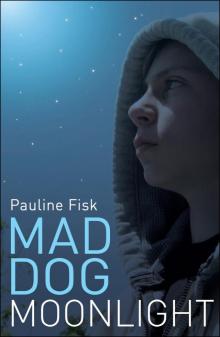 Mad Dog Moonlight
Mad Dog Moonlight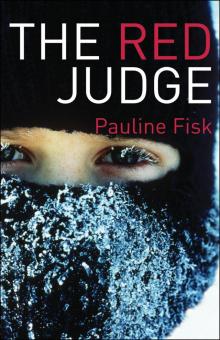 The Red Judge
The Red Judge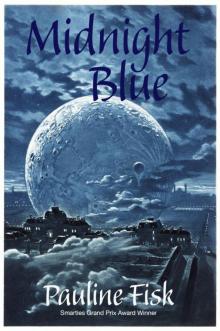 Midnight Blue
Midnight Blue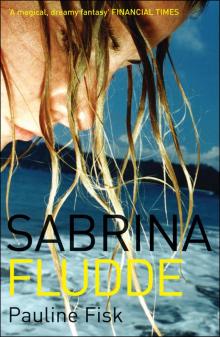 Sabrina Fludde
Sabrina Fludde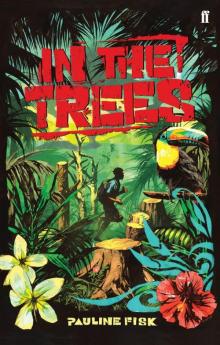 In the Trees
In the Trees